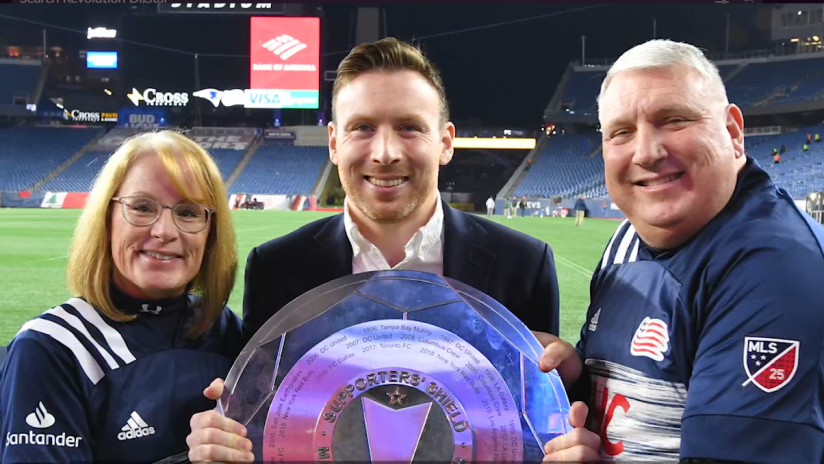FOXBOROUGH, Mass. – Tommy McNamara was driving home the night of November 17, 2021, when a phone call from his parents brought news that forced him to pull over to the side of the road. Sitting alone in his car, in the dark, he struggled to process the information coming through the line.
“Cancer?” McNamara thought to himself. “It can’t be cancer. She never smoked in her life. She’s young. She’s fit. She’s healthy. How is it cancer?”
Since mid-September, Tommy’s mother Kerry had been having trouble breathing, and in early November the issue worsened to the point that a trip to the emergency room was necessary. The next week brought a battery of tests that revealed a collapsed lung, and the inevitable questions followed.
What caused this? What are the possibilities? How do we fix it?
Naturally, while awaiting an official diagnosis, McNamara and his parents began searching for potential answers. They had recently returned from a trip to altitude, so there was a thought that perhaps the strain had collapsed Kerry’s lung. There was also the chance of infection. Then, there amongst the possibilities, was cancer, an outcome that McNamara didn’t give more than a passing thought.
“They’re going to fill the lung back up, she’s going to recover, and that’s going to be it,” McNamara said of his thought process at the time. “There’s nothing to worry about here.”
Then came that phone call on November 17. Kerry had been diagnosed with stage IV non-small-cell lung cancer. The McNamaras had one answer. Now, they needed more.
Twenty percent of all lung cancer patients are non-smokers. That’s the fact that blew McNamara away as he began digging into research on the topic, and it was the preconceived notion that lung cancer is caused almost exclusively by smoking that led him to originally dismiss it as a possibility.
“I guess I knew that, yeah, you could probably get lung cancer from not smoking, but the possibility of that happening was so incredibly low in my head that it was virtually non-existent,” said McNamara. “But obviously it wasn’t the case, so it was just like, how were you diagnosed with it if you never smoked, if you lived well, eat well, you exercise?
“Then I came to realize that 20 percent of people that are diagnosed with lung cancer never, ever smoked in their life. That number kind of just jumped out to me because that’s a pretty high number. Unfortunately, my mom is in that 20 percent, but hopefully a lot of good can be brought out and a lot of awareness can be raised as a result of this.”
Soon after processing the initial shock of the diagnosis and understanding the steps on her own road to recovery, Kerry’s thoughts gradually began to shift. Her family had been rocked by the news, and she couldn’t help but think about others dealing with the same diagnosis in the future, and other families struggling to cope with the stress and strain of seeing a family member undergoing cancer treatment. She wondered constantly what could be done to help ease that strain.
Kerry shared those thoughts with Tommy, and an idea was sparked.
“I talked to my mom about this,” McNamara said. “Once she wrapped her head around the diagnosis, what her life was going to look like now, what may happen, she said she hopes that as awful as the situation is for her and for the family at the moment, she hopes that some sort of good can come about this for somebody else in the future.”
Lung cancer research is one of the most underfunded areas of cancer research, in part due to the stigma around lung cancer and the notion that it’s caused primarily by smoking. McNamara set out in part to help end that stigma, but more importantly, to raise as much money as possible for critical research, which has made significant strides with regards to treatment in recent years.
As a professional athlete, McNamara knew that he had both a product and an audience, and the concept of an auction began to take shape. The initial idea was for a small auction featuring “four or five pieces” of McNamara’s personal memorabilia and perhaps one or two items from friends within the sport of soccer. But as he began to reach out to members of the New England Revolution organization and friends within the game, he soon realized that he had enough support to make a more significant impact.
By the time the auction launched on November 9, McNamara had 19 different items up for bid, ranging from gameday and training session experiences with the Revolution to signed gear from the Revs, the New England Patriots, New York City FC, Real Salt Lake, Nashville SC, and the U.S. Men’s National Team.
“My friends and teammates were all great,” said McNamara, who acquired signed jerseys from Matt Turner, Carles Gil, Andrew Farrell, DeJuan Jones, Brandon Bye, Walker Zimmerman, Teal Bunbury, Scott Caldwell, and the entire NYCFC squad. “I just mentioned, ‘Hey, if you have a jersey or something like that you’d be willing to contribute, I’m doing this fundraiser, it would mean a lot to me. And they were all like, ‘Yeah, no problem,’ and immediately made sure to get me a jersey.”
McNamara also praised David Campopiano, the Revolution’s Director of Fan and Community Engagement, for quickly convincing him to widen the scope of his fundraiser, and club president Brian Bilello, who “immediately had three really great ideas” for team-centric experiences that the Revolution could offer when McNamara approached him with the concept.
“I’m very appreciative of the club,” said McNamara. “It’s really great people that work there and I’m very thankful that they were, at the drop of a hat, willing to help me so much.”
Having launched the auction on November 9 with a brief video on his own social media channels, McNamara was floored by the immediate response as friends and family began sharing the auction themselves unprompted, spreading the message far and wide.
“To see everybody that wanted to also push it out and kind of retweet it or share it on their story, they did that on their own accord, and that meant a lot to me,” McNamara said. “I’m really grateful to them.”
Less than one week after the auction launched it had raised almost $5,000 for the Lung Cancer Research Foundation, with more than two weeks still remaining until the auction ends on November 30.
Kerry McNamara has seen firsthand the benefits of lung cancer research. Her non-small-cell lung cancer (with the EGFR genetic mutation) is treated with targeted therapy, consisting of a daily pill that is able to target the cancer cells in her body and nothing else. It’s a pill that only exists because of recent developments in research.
“As a result of funding and research, these targeted therapies, a lot more have come out in the last three, four, five years, and they’re constantly, more and more better therapies are coming out down the road in the future,” said McNamara, noting that treatment previously consisted of chemotherapy and radiation, which was less effective and far harsher on the body. “With additional funding, with the research from all these doctors and new therapies that have come out, this targeted therapy over the last three or four years has had a very positive effect on the quality of life of patients and just the length of time that they’re given to live.”
Kerry also undergoes two-hour, low-level chemotherapy sessions once every three weeks as an added form of treatment – “because she’s young and she’s fit and healthy outside of this diagnosis,” McNamara said – and she has regular checkups every three months. The targeted therapy is working, reducing the size of the cancer cells in her body and allowing her to live a somewhat normal life with manageable side effects outside of her treatment. She recently became a grandmother.
But there will come a time when Kerry’s body will adapt to her current treatment, and this particular targeted therapy will become less effective. It could be two years, three years, maybe five years. But eventually she’ll need to progress to a different targeted therapy to keep up with her cancer, which is why continued awareness, funding, and research is so important for lung cancer patients.
McNamara’s auction is one small piece of the puzzle.
“She’s hopeful and we’re hopeful that it can make an impact down the road, that a new medicine or a new technology can be developed that can affect the quality of life of future patients,” McNamara said. “There is no cure at the moment, but ultimately at one point down the road, [the goal is] trying to find a cure for lung cancer.
“(The auction) was something that I wanted to do on my own, but then I was inspired more so to do it after hearing my mom say that her mentality had switched from feeling bad for herself to, as awful as this is for me, I hope that some sort of positive can come out of this and affect somebody else positively in the future.”











